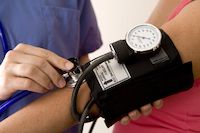High Blood Pressure Possibly Linked to Valvular Heart Disease
A recent study found that elevated systolic blood pressure could potentially be associated with a 3-fold increased risk of valvular heart disease.

A recent study has added new evidence to a possible association between elevated systolic blood pressure (BP) and an increased risk of major valvular heart disease.
Analyses of more than 3500 patients who had a diagnosis of valvular heart disease revealed that those with increased systolic blood pressure had a 3.26 times greater risk of aortic stenosis.
In order to examine the potential association, investigators performed a mendelian randomization using individual patient data from the UK Biobank. Investigators identified cohort of 502,602 people between the ages of 40 and 96 at baseline that were recruited between 2006 and 2010. Data analyses were performed between June 2018 and Jan. 2019.
Systolic blood pressure was measured twice using automated equipment and, because of variation between first and second measurements, investigators used systolic blood pressure as the mean of the 2 measurements. International Classification of Diseases and Health Related Problems, Tenth Revision codes were used to identify incident aortic stenosis, aortic regurgitation, and mitral regurgitation.
For the purpose of their analyses, investigators only included a cohort of 329,237 participants with White British ancestry. This group was 53.99% women, had a mean age of 56.93 years, and 1.08% (3570) had a diagnosis of valvular heart disease. Of the 3570 patients with a diagnosis of valvular heart disease, there was 1491 cases (0.45%) of aortic stenosis, 634 cases (0.19%) of aortic regurgitation, and 1736 cases (0.53%) of mitral regurgitation. 

Investigators found that each genetically associated 20-mm Hg higher systolic BP was associated with approximately 3-fold greater odds of aortic stenosis in an age- and sex-adjusted model (OR, 3.29; 95% CI, 1.52-7.12; P = .002). Investigators noted that adjustment for additional variables had minimal change on the results. 


Additionally, investigators found a similar, yet less robust, association between systolic blood pressure and aortic regurgitation in both the age- and sex-adjusted model (OR, 2.56; 95% CI 0.73-8.85; P = .13) and in the fully adjusted model (OR, 2.59; 95% CI, 0.75-8.92; P = .13). Similar patterns were observed when investigators examined the association between systolic blood pressure and mitral regurgitation for the age- and sex-adjusted model (OR, 2.22; 95% CI, 1.09 to 4.52;P = .02) and the fully adjusted model (OR, 2.19; 95% CI, 1.07-4.47; P = .03).
Investigators noted multiple limitations within their study. Number of some types of valvular heart disease investigated were low, which lead to wide confidence intervals. Investigators lacked statistical power for detection of modest mediating associations. Due to the study relying on data from electronic health records, investigators acknowledge there may be some degree of misclassification. Lastly, the study population was restricted to Europeans.


Within their conclusion, investigators noted that because their study was a mendelian randomization and because of this is less prone to confounding and reverse causation, which suggests that blood pressure-lowering treatment may be a useful strategy for prevention of valvular heart disease. 


This study, titled “Systolic Blood Pressure and Risk of Valvular Heart Disease,” is published in JAMA Cardiology.